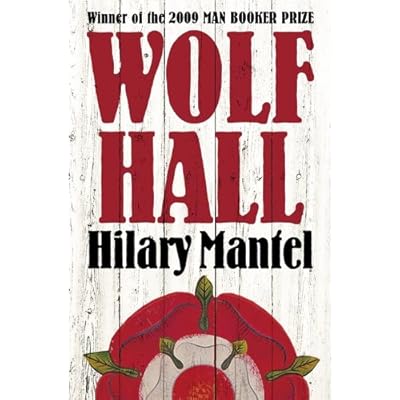 When Wolf Hall won the Booker Prize in 2009, I was slightly disappointed. It was one of those books on both, the longlist and the shortlist, that I didn't want to read. I can't quite put my finger on what it was, but there was zero motivation to read the book.
A couple of weeks back though, I pulled it out from my Chunksters shelf, and decided to give it a go, prepared to abandon it midway. But, from the minute I started it till the time I turned the last page, I was totally mesmerised, and was kicking myself (not literally) for not pulling it down sooner.
When Wolf Hall won the Booker Prize in 2009, I was slightly disappointed. It was one of those books on both, the longlist and the shortlist, that I didn't want to read. I can't quite put my finger on what it was, but there was zero motivation to read the book.
A couple of weeks back though, I pulled it out from my Chunksters shelf, and decided to give it a go, prepared to abandon it midway. But, from the minute I started it till the time I turned the last page, I was totally mesmerised, and was kicking myself (not literally) for not pulling it down sooner.
Wolf Hall, at 650 pages, has Thomas Cromwell, 1st Earl of Essex, as the central character. While it's set before and during the English Reformation, the focus is not King Henry VIII or Anne Boleyn; instead, it's the man who was the King's right-hand man.
But - how does a boy, a blacksmith's son, who doesn't even know his own birthday - get to be the King's favourite, and play such an instrumental role in the events that shaped British history? That's the angle Mantel has approached this book from. Fictionalising some of Cromwell's life, while following the actual historical events of the 1500s, she casts Cromwell as a sympathetic loyal family man and not the devil that everyone thinks he is. What is actually incredible is though, while portraying him as the hero (and not the anti-hero), Mantel does share what everyone around Cromwell thinks of him, and some of the things said are far from flattering. The high opinion the reader has of Cromwell though - it never changes. It doesn't even waver. Haunted by personal tragedies, his father's wrath, experiences abroad after running away from home post being victimised by his father's drunken beating once again, Cromwell's rich character shines through.
The Reformation is essentially about King Henry VIII wanting to divorce Katharine the princess of Aragon to marry Anne Boleyn. To do this, the Church of England is forced to break away from the authority of the Pope and the Roman Catholic Church, as the Pope would never void a legitimate marriage. King Henry VIII insists that Katharine was not a virgin when he married her, thereby meaning the marriage was never actually legit.
"Some say the Tudors transcend this history, bloody and demonic as it is: that they descend from Brutus through the line of Constantine, son of St Helena, who was a Briton. Arthur, High King of Britain, was Constantine's grandson. He married up to three women, all called Guinevere, and his tomb is at Glastonbury, but you must understand that he is not really dead, only waiting his time to come again.
His blessed descendant, Prince Arthur of England, was born in the year 1486, eldest son of Henry, the first Tudor king. This Arthur married Katharine the princess of Aragon, died at fifteen and was buried in Worcester Cathedral. If he were alive now, he would be King of England. His younger brother Henry would likely be Archbishop of Canterbury, and would not (at least, we devoutly hope not) be in pursuit of a woman of whom the cardinal hears nothing good: a woman to whom, several years before the dukes walk in to despoil him, he will need to turn his attention; whose history, before ruin seizes him, he will need to comprehend.
Beneath every history, another history."
Real-world events of historical significance, the wars and economic concerns and a rich cast of characters all come together in Wolf Hall. The significance of the title is not lost on the readers as well. As Mantel says in an interview:
Wolf Hall, the Seymour House in Wiltshire, is where we're going at the end of this book. But of course, I chose it primarily for its metaphorical resonance: who could resist it? The whole of Henry's court is Wolf Hall.
Cromwell makes everything his business, his loyalty, first to the disgraced Cardinal and then to the King unequivocal. His occasional thoughts about Anne, who he doesn't really seem to like, are hilarious though.
A little later he hears that Anne has taken wardship of her sister's son, Henry Carey. He wonders if she intends to poison him. Or eat him.
Anne really doesn't come across as a likeable character or Queen though. Instead, the Princess of Aragon seems to have a lot more character, and subsequently, a lot more respect from Cromwell. His interactions with both are delicate, as he tries to make peace and do what is right by the King - not questioning him - which might, in fact, be his biggest failing. It's almost a case of the Henry saying "Jump" and Cromwell replying with "How high?"
Even when Thomas More is in the Tower, awaiting his punishment for not condoning the divorce or the split from Rome, he tries to prompt him to ask for forgiveness, saying Henry's a compassionate monarch. And it's parts like this that makes Cromwell come across as a nicer person than history might indicate. Obviously, certain chunks are fictional, but to take a hated character from history and to turn him into - well, Cromwell in Wolf Hall does take serious talent.
The power struggles, the jealousy, the humour and the emotional baggage that everyone's carrying - it all comes across, so stark, so clear, that every character is ambiguous. There's no black and white. There's no sinner, there's no saint. It's a lot like the real world today - everyone has their place, and everyone has their endgame. To manage that with such a myriad of characters (we actually do meet practically anyone and everyone who was involved in the Reformation, or had a part in Henry's Court or knew Cromwell) is incredibly commendable, and I found it quite difficult to judge the characters or find out if I liked them or not. Cromwell and his family though - loved them to bits. And the Cardinal.
My only gripe with this book was the way Mantel referred to Cromwell - always in the third person pronoun: He. Occasionally, paragraphs and pages had to be re-read, but that's a small gripe compared to just how fantastic I thought the rest of this book was. There is meant to be a sequel in the pipelines, and I can't wait to read that. Off we go to Wolf Hall, and see what transpires next...
 Belated birthday wishes to Anita Brookner, and a day late, but a happy
Belated birthday wishes to Anita Brookner, and a day late, but a happy 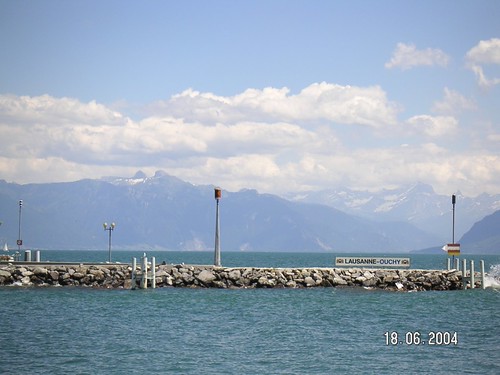

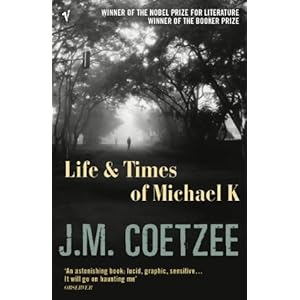 Life and Times of Michael K won the Booker Prize in 1983, and it's been one of Coetzee's books that I've wanted to read for a really long time. The name intrigued me: who is Michael K? And, what is it about his life and times that merits a novel?
Life and Times of Michael K won the Booker Prize in 1983, and it's been one of Coetzee's books that I've wanted to read for a really long time. The name intrigued me: who is Michael K? And, what is it about his life and times that merits a novel?
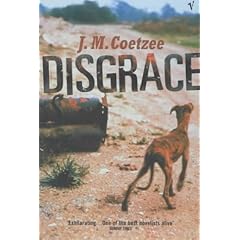 This is the final post on the
This is the final post on the 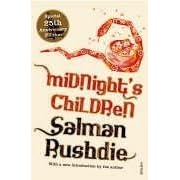 The winner of the Booker Prize in 1981, the Booker of Bookers in 1993, and the Best of the Booker in 2008, this book is much-acclaimed and highly recommended. The
The winner of the Booker Prize in 1981, the Booker of Bookers in 1993, and the Best of the Booker in 2008, this book is much-acclaimed and highly recommended. The  I'm trying to read all the Booker winners, in the next couple of years. This painstakingly dull book, filled with unengaging characters and a pointless plot adds a serious blemish to my plan at the very outset. I struggled through the first thirty pages, and struggled some more 'til I hit page 89, in a week... And then... then I just gave up, and figured this book is not for me. I mean, what a gigantic waste of my reading time!
I'm trying to read all the Booker winners, in the next couple of years. This painstakingly dull book, filled with unengaging characters and a pointless plot adds a serious blemish to my plan at the very outset. I struggled through the first thirty pages, and struggled some more 'til I hit page 89, in a week... And then... then I just gave up, and figured this book is not for me. I mean, what a gigantic waste of my reading time!